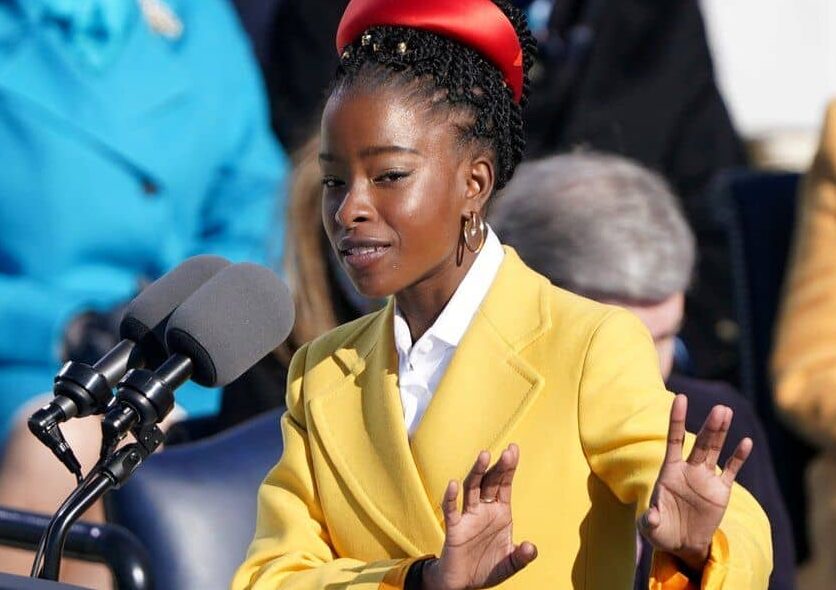Rijneveld steps down from translating Gorman’s ‘The Hill We Climb’ into Dutch
Amanda Gorman’s poem The Hill We Climb (2021) famously took the Biden inauguration by storm. Gorman writes about the divisions in America, with hope for reconciliation and peace in the nation’s future. The poem ends with the moving lines “if only we’re brave enough to see it./ if only we’re brave enough to be it.” This proves an effective call to arms for the American people to resist another ‘Trump era’, and to use the Biden administration as an opportunity to develop America away from its inequality riddled past.
However, this poem has recently been the subject of online controversy, due to the Dutch publisher Muelenhoff’s decision to hire Marieke Lucas Rijneveld to translate Gorman’s work into Dutch. Rijneveld is a white, non binary writer, and the first Dutch Author to win the International Booker Prize in 2020, with their translator, for their debut novel The Discomfort of Evening (2020). Following the announcement of Rijneveld as Gorman’s translator, Janice Duel, in a piece in Volkskrant, suggested that this choice was a missed opportunity, and should have been made in favour of a black female translator. This, along with the ensuing media backlash, led to Rijneveld publicly stepping back from the role, for which Duel thanked them on twitter.
Duel’s witch hunt of Rijneveld and Meulenhoff is intensely dangerous, counterproductive and ill informed
In some ways, Duel seems right to point out the deficit of diversity in high profile literature, and the significance of emotion in word choice which may be better reflected by a translator of a similar identity. A black female translator may be able to relate to Gorman’s experiences of racism more directly, and therefore may make more representative word choices in the Dutch version of the poem. This question of representation is particularly pertinent in the instance of The Hill We Climb, due to its timeliness and significant political context and motivations. As a result, Duel’s motivations and arguments, and the following support from some on social media, can be understood, as they are driven by very real concerns of authenticity and emotional and political impact.
Nevertheless, Duel’s witch hunt of Rijneveld and Meulenhoff is intensely dangerous, counterproductive and ill informed. Rijneveld was disappointed about surrendering this excellent and purposeful opportunity to translate Gorman’s work. This comes after publicly rejoicing at the opportunity to celebrate work with “the power of someone who looks to the future instead of looking down”. Not only is this a blow to the Dutch translator, but Gorman had reportedly chosen the translator herself, proving that it was not an executive, whitewashed decision made by Meulenhoff as Duel portrayed it.
Duel’s demand for Meulenhoff to choose a black writer, with no suggestions in mind, not only removes Gorman’s agency over her own work but also trivialises black writing
Subsequently, despite Duel’s good intentions, their media campaign has ironically meant that the translator chosen and trusted by Gorman to represent her work, will no longer be fulfilling this role. Here, the dangers of misinformation and hasty political interventions in the media is made apparent, as removed and uninvolved figures have had more input over Gorman’s texts in the Netherlands than she has.
Furthermore, although concerns of representation are incredibly important in literature, as a lack of connection with a translator can impact translatory decisions, this presents a slippery slope in over politicization in the media. Rijneveld’s white identity does not erase their identity as one of the most prestigious and internationally recognised Dutch writers. Rijneveld’s white identity also does not immediately equate to Rijneveld not being able to relate to and convey Gorman’s message of division and hope for the future- a universally modern message which can be translated to a global context. In fact, Duel’s demand for Meulenhoff to choose a black writer, with no suggestions in mind, not only removes Gorman’s agency over her own work but also trivialises black writing.
In translating The Hill We Climb into Dutch, Rijneveld would be contributing to the gradual inspiration of future black translators and writers. This is a long term improvement to the problems that Duel seeks to cover with short term fixes, forced diversity, and superficial quotas, which do not truly address the reason for the lack of choices for black Dutch translators.
Overall, it seems clear that Rijneveld’s resignation from the role of Gorman’s translator is an avoidable and disappointing loss, based on flawed motivations as well as superficial and removed political commentary in the media.

Comments